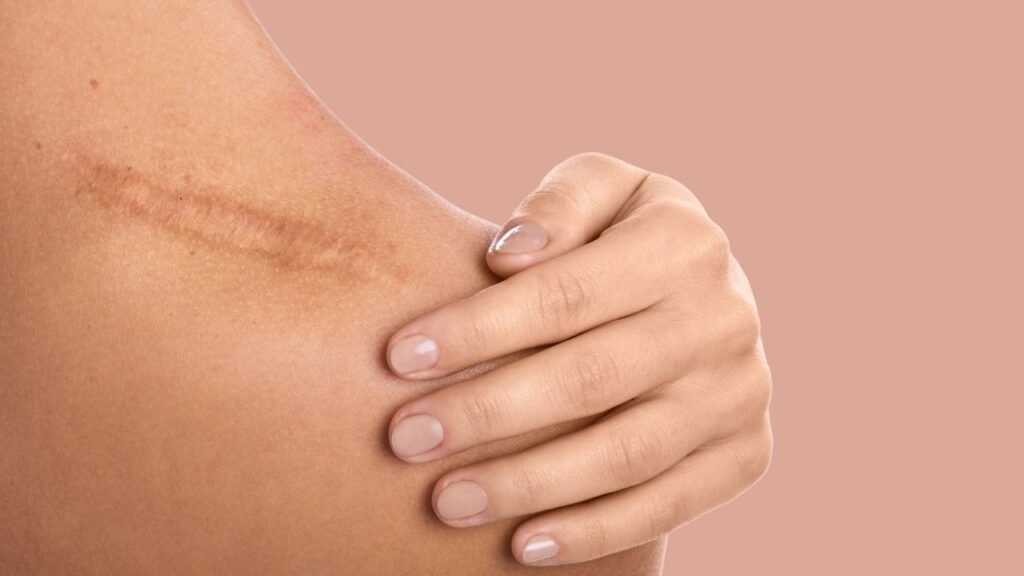9 Effective Tips to Get Rid of Dry Skin

Table of Contents
Do you have flaky, itchy, or dry skin? Surely you must be looking forward to getting rid of it soon. However, easing the dryness on your skin not only depends on how you clean it but also the air around you, the clothes you wear, and the products you use.
Dry skin can occur in any season, but it becomes more itchy and uncomfortable in winter when there’s no humidity. In addition, the cold and dry atmosphere in winter dehydrates your skin, causing it to get dry and crack.
Even forced heating inside can steal more moisture from the surrounding air, leaving you with dry, itchy, and flaky skin. To treat dry skin at home takes a little knowledge and research.
Call Our Specialist
Effective ways to get rid of dry skins by Dermatologist
Normally, you lose around 50-100 hair strands a day. However, new strands of hair grow on the scalp simultaneously. Numerous factors cause hair loss, like:
- Heredity: pattern hair loss with age in both men and women
- Hormonal imbalance or health complaints
- Intake of certain drugs or supplements
- Radiation therapy
- nutrient deficiency
- Traumatic incidents that lead to anxiety and stress
- Hairstyling and chemical treatments
- Poor diet
Add Humidity
Lower temperature, especially during winter or staying too long in an air-conditioned environment, can reduce moisture in the air, which can cause dryness of the skin. For this, you can invest in a humidifier. Humidifiers add necessary moisture back into the air and into your skin. Here is the list of the best humidifiers available in India:
- Honeywell Cool Mist Humidifier (HUL535B)
- Allin Exporters Cool Mist Ultrasonic Humidifier
- Honeywell HUL520R Mistmate Cool Mist Humidifier
- Deerma F628 Humidifier
- Allin Exporters Cool Mist Ultrasonic Humidifier 4L
- Philips HU4706/21 14W Desktop Humidifier
- USHA HU 3403 Humidifier
You can avail these from online shopping platforms or nearby electronic stores.
Cut Down on Cleansing
You can’t just get away by washing your face only once a day or just rinsing your face with a splash of water. For a gentler approach, try cleansing products of creamy consistency rather than lather based consistency. As harsh bar soaps in the shower are laden with detergents and fragrances, irritating the skin. So instead, choose a mild soap, like the white Dove Beauty Bar, that has a healthy dose of moisturizing cream.
Warm, Not Hot
Always use lukewarm water in the shower, even during winter. This is because the hot water strips away the natural oils and hydrators from the skin, which makes the skin lose water into the atmosphere. Also ensure, the door is closed when you’re taking a bath to trap the steam in the bathroom so that your skin can soak it in.
Apply moisturizer
Don’t wait until the skin is too dry to apply moisturizer. Product absorption through the skin is maximized when skin is slightly damp. The best time to apply moisturizers in creams or lotion formulations is immediately after a shower when you gently towel off excess water. Experts suggest it’s best to apply moisturizers within 10 minutes of the bath to trap water molecules onto the skin.
Know the skincare Ingredients
Instead of just purchasing a lotion or cream that claims to heal dry skin, be sure to check if it contains a hydrating ingredient, such as ceramide, glycerin, lactic acid, shea butter, stearic acid, dimethicone, urea, or mineral oil. If you already have dry skin, find an oil-based cream or lotion. And if you have sensitive skin, use products with glycerin, as the other ingredients start a burning sensation on irritated skin. Avoid moisturizers that contain fragrances or alcohols, which can exacerbate dry skin.
Switch to a heavier base cream if you are prone to dry skin. Remember to use creams with SPF in your morning routine, even in dry seasons.
Swap your moisturizer with a winter-friendly formula
Maintaining a healthy skin barrier is important for reducing water loss and keeping irritants/allergens and environmental pollutants at bay. The outer layer of skin (stratum corneum) is like a wall made of keratinocytes (bricks) and a lipid matrix (mortar) that holds these skin cells together to protect our inner body. This lipid mixture comprises ceramides, cholesterol, and fatty acids.
Ideally, moisturizers should provide a balanced ratio of these key ingredients. This should be considered for people with eczema-prone skin, chronically dry skin, or guarding the skin against pollutants or other elements. Look for a moisturizer with ingredients like linoleic acid, sphingolipids, sterols, phospholipids, stearic acid, and oleic acid that provide skin repair and relief from dryness.
Lips Get Dry, Too
Keep a lip balm with you at all times. The best way to treat cracked, dry lips is to use a lip balm that will seep into your lips. In addition, you can use simple products like vaseline to prevent hydration evaporation from lips, keeping them smooth and moist.
Pay Attention to Nails
Nails also can get damaged from the constant exposure to manicures, acetone, and even saliva for those who bite their nails. Regularly practice good nail and hand habits, including twice-daily moisturizing with a ceramide-based cream, applying a barrier repair ointment to prevent moisture loss and avoiding constant washing of hands.
Follow a healthy diet
The building blocks for healthy skin include fats, proteins, and vitamins. Follow a diet with “healthy fats” like olive oil fish, take a daily multivitamin and drink plenty of water. The skin has the potential to reflect the hydration levels and water intake and can look duller and aged within a day or two of reduced intake. Hence, practising good hygiene for hair, skin, and nails is essential to avoid damage and prevent moisture loss.
Conclusion
Your skin should feel better quickly if you follow these tips. However, consult with a dermatologist if these changes do not bring relief. For example, extremely dry skin may need prescription ointment or cream. It can also be a sign of a serious skin condition that needs treatment. A dermatologist can properly examine your skin and guide you in the right way to help reduce your discomfort.












